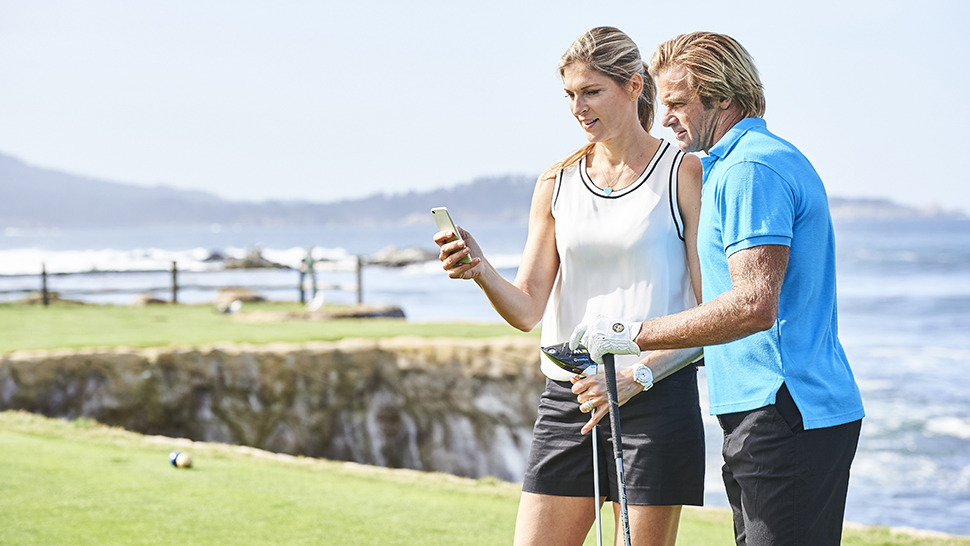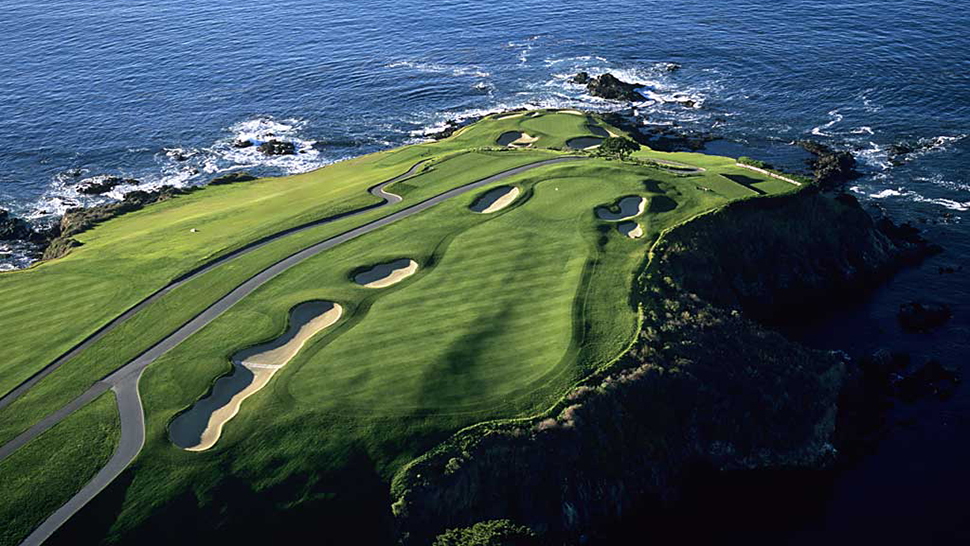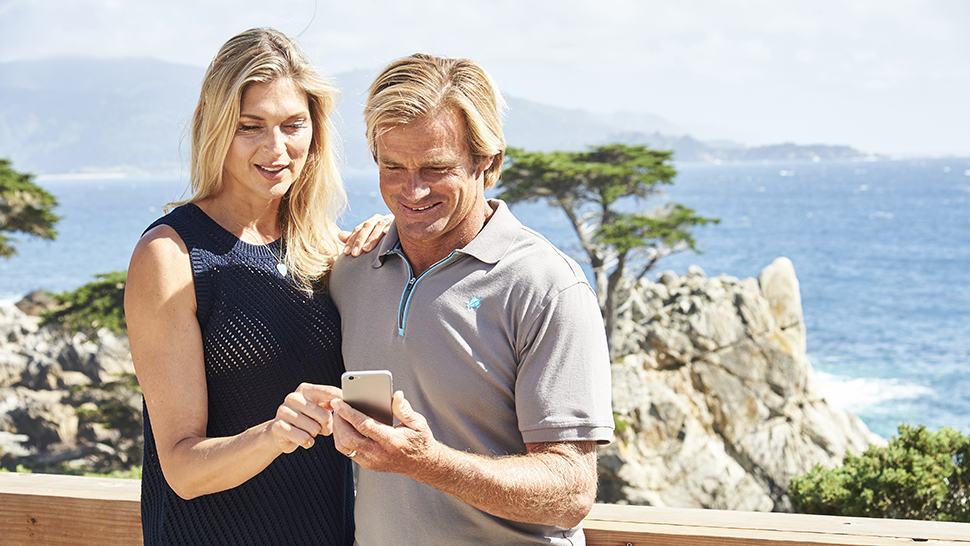
When IBM decided to introduce a new Watson-powered travel app to the luxury travel market, it wisely thought a good place to focus on was Pebble Beach, an enclave of California resorts that’s beloved around the globe for its elegant accommodations (Forbes Travel Guide Four-Stars The Inn at Spanish Bay and The Lodge at Pebble Beach), spectacular scenery (17-Mile Drive) and incredible golf (2019 U.S. Open host).
Instead of simply releasing the resort’s official mobile app to the masses, IBM asked one of the world’s most active couples, Gabrielle Reece and Laird Hamilton, to test the e-tour guide/concierge out first. The move made great sense, seeing as how the spry volleyball legend and surfing icon run businesses, train and travel as if they’re Olympic sports.
During their time at Pebble Beach, Reece and Hamilton played a few holes, cruised the scenic roads and ate where Watson suggested. After the trip, we caught up with the on-the-go twosome to get the play-by-play on the virtual experience and learn a few real-life travel tips.
Laird, you’ve been an innovator in water sports and nutrition. What was it about this particular project that piqued your interest?
Hamilton: Obviously, the innovative aspect of it spoke to me. The whole thing is really connected to our lifestyle and the brand philosophy between Gabby and I. This app that IBM’s created is about getting out and doing things, being more productive with your time.
That’s something that has become more and more of a concern to us as we get busier. We have kids and try to do 80 different things at once. Being productive with your time, especially when you’re trying to enjoy yourself, is something I believe in.
I think doing things that are fun, that you enjoy, is an important part about being healthy. To have a personalized tour guide like Watson tell me, “What do you want to eat? What are you interested in?” [is great]. It’s like a concierge in your pocket.
It made for a real productive experience. It added a unique aspect to a trip and a drive that you wouldn’t have unless you had somebody that lived there hanging out with you.
Gabby, can you speak to any specific instances where this app helped you during your trip?
Reece: Absolutely. We finished playing golf at Pebble Beach on the 18th. I was hungry so I told Watson, “Can you tell me where to eat?” Watson would tell me, “Do you want to sit down or do you want it to go?”
Not only does it create options based on what you want at that moment, but it tells you the specials at this place that you should ask about. For me, that’s an element where now it feels like I’m getting what I want.
It’s very clear about where to go and where it’s located — which is nice when you’re with your beloved or your children.
Maybe the richest part of [the app] was, on the drive, where you’re getting to learn about the coastline and learning about seals and why trees in certain parts are growing a certain way. It’s like having a tour guide as you go along.
It just created such a rich experience for me and made it so much more interesting.
Had you been to Pebble Beach before? How did this new technology change your experience there?
Reece: We’ve been to all of the surrounding areas. We went to a wedding recently right in that area but, quite frankly, we’ve never had the opportunity to go specifically to Pebble Beach.
For us, it was even better because on our entry into Pebble Beach we got to learn so much about the area in a short period of time. It is, obviously, a very beautiful stretch. It’s exquisite.
But again, having this local sort of knowledge going to a place you’ve never been, I don’t think you can beat it.
Laird, I’d love to go back to a point you made earlier about “being productive with your time.” Can you give a few tips to travelers who want to be more productive on the road?
Hamilton: That’s why I think that being healthy is so important to me. When you’re eating good, you have good hydration and you do some sort of breath work and meditation, then you’re a lot more productive with your time. You’re not spending half the morning trying to get your brain conscious and you’re not eating garbage and you don’t breathe right.
I always say that, “If anyone is going to waste my time, I’m going to waste my time.” I don’t need anyone else wasting my time. I have a friend, actor John McGinley, his dad told him, “If you can’t be on time, be early.”
And then there’s technology and using it in a way that helps save time and not necessarily eat time. You can get on these devices and get swallowed up and justify being on them. At the end, is that more productive than just using 15 or 20 minutes for breathing and doing meditation in the morning when you first wake up?
Reece: If you’re in a place that you don’t know and you don’t have an app like Watson, call hotels and talk to the concierge. If they want to go on an adventure, call the best hotel and ask, “What’s the best place to do a surf lesson, rent a bike or go on a hike?”
When people slide in those mini adventures on their business trips, I think it really adds to the whole experience.
How do you guys stay focused with your nutritional game plan when you travel so much?
Reece: When you’re at home and you are in control, do the best that you can there because, when you go on a trip and you deviate for three or four days, you don’t want to stress out.
Sometimes, depending on your situation, it’s almost better to drink more water or drink or more coffee, than eat some crappy food, if you can avoid it. But I think it’s never about creating stress around those things because that’s even worse than eating the bad food.
Take advantage and seize the moment [and say], “Hey, I’m in my environment. I can really be in control. I can be on top of my game. So, if I travel, I have to loosen up a little bit. If I don’t get exactly what I need or want, I’ll be okay.”
Hamilton: To combine with that, you should have a couple of little tricks in your bag, a few staples. I’m not pushing my stuff but I have a high-quality [Laird Superfood] coffee product that I carry. I bring protein powder and macadamia nuts. I also have a thing called Instafuel that I take with me.
If I have to eat a garbage airplane meal, I’ll just as soon take a few Instafuel and not have an appetite and not have to eat that garbage. If you can travel and bring a little emergency back-up kit that can cover you, and a few staples that you’re already relying on, that’s helpful.
Reece: On the road, you really have to watch the booze and the sugary drinks. That will kick your butt.
Hamilton: First of all, people don’t give flying enough respect. You get on a plane and fly 14 hours — or 10 or eight or whatever it is — and get off the plane and say, “Oh, I’m going to go work out.”
Meanwhile, you’ve stressed your body so intensely, flying along at 400 knots and 30,000 feet. You could use some nurturing. Take a hot bath. Eat nice food. Do a sauna. Nurture the system because that stuff is hard on us.
Sometimes we have a tendency to add grind on grind. Okay, we’re grinding. Now, we’re going to grind more. That is undermining our ultimate health at the end.
We get endorphin highs and other stuff from working out that make us think it’s okay, but it’s a lot harder on us than we think. We need to nurture our system a little more than we do. We’re already hammering them enough as it is.



